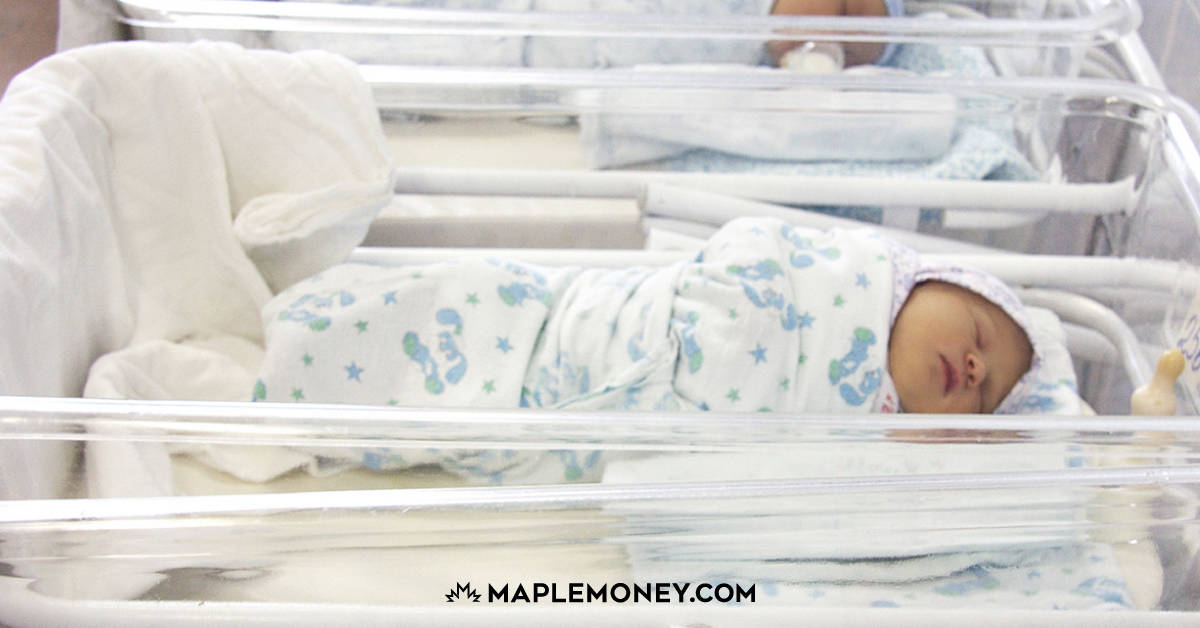Maternity and Parental Leave 101: Just the Facts, Baby

Compared to most industrialized nations, Canada has a better than average national parental leave program.
Some countries, such as the United States, offer pathetic programs. Their Family Medical Leave Act (FMLA) only covers mothers for 12 weeks of unpaid leave with guaranteed job security (except in smaller companies). Some states do offer more comprehensive maternity leave options than others, just as some companies may offer extended benefits.
Some countries offer parental benefits that we can only dream about. In Sweden, for example, a mother is eligible for 16 months of parental leave split between herself and her partner, while still receiving 80% of her pay.
In Canada, we fall somewhere in the middle. While some companies offer top up programs for income, or extended leaves with job security, most working mothers will only receive basic maternity benefits, which fall under Canada’s Employment Insurance program.
These benefits are paid to birth mothers and surrogate mothers for up to 15 weeks. To receive maternity benefits you must have worked for 600 hours (about 15 weeks full time) in the last 52 weeks or since your last claim.
Mom can begin collecting maternity benefits a few weeks before the birth of the baby, but benefits end 17 weeks after the baby is born or the expected due date, whichever is later. If your baby is hospitalized, this 17-week window may be extended – the payments are not extended, just the deadline by which they can be collected.
As with maternity benefits, to receive parental benefits you have to have worked for 600 hours in the last 52 weeks or since your last claim. Parental benefits can be collected by either the biological or adoptive parents for up to a maximum of 35 weeks. These benefits can be claimed by one parent or shared between the two partners, but cannot exceed a combined maximum of 35 weeks.
Parental benefits must be claimed within the 52 weeks following the child’s birth, or for adoptive parents, within the 52 weeks from the date the child is placed with you. If your baby is hospitalized, this 35-week window may be extended.
In 2009, both maternity and parental leave payments were capped at 55% of your average insured earnings up to a yearly maximum insurable amount of $42,300. This places the current maximum payment at $447 per week. You could receive a higher benefit rate if you are in a low-income family. Your payment is a taxable income, meaning federal and provincial or territorial taxes will be deducted.
What if Something Goes Wrong?
If the mother experiences complications related to the birth of a child, she may be eligible for sick leave in addition to maternity leave. Sickness benefits may be paid up to 15 weeks to a person who is unable to work because of sickness, injury or quarantine. Mom must meet the 600 hours worked in the last 52 weeks or since her last claim requirement, and a doctor’s note will be required.
She could receive up to a maximum of 65 weeks of combined sickness, maternity and parental benefits instead of the normal combined maximum of 50 weeks. Often, sick leave is used in cases where the mother is confined to bed rest for pregnancy-related complications, or she has other pregnancy-related issues that prevent her from working.
But I’m my Own Boss!
In 2010, the government introduced the Fairness for the Self-Employed Act. Previously, self-employed Canadians were not eligible for maternity or parental leave benefits. With an estimated 900,000 self-employed women in Canada, this was clearly an important issue.
Under the new legislation, self-employed Canadians can now receive similar benefits to other employed Canadians if they opt into the program at least one year prior to claiming benefits and are responsible for making premium payments starting with the tax year in which they opt in to the program.
The self-employed pay the same premium rate that salaried employees currently pay. They are not required to pay the employer’s portion of the premium rate, as they do not have access to EI regular benefits. Self-employed workers can opt out of the program at the end of any tax year, as long as they have never received benefits – if they received benefits, they are not permitted to opt out.
A Little Something on the Side
Working while on leave can be a good way to earn extra money, whether it’ll be used for making ends meet, paying for those extra baby sign language classes, starting or topping up an RESP.
It doesn’t make financial sense to work while on the maternity portion of the benefit, as your earnings will be deducted dollar for dollar from your benefits. However, there might be circumstances where you benefit professionally from working a bit while receiving maternity benefits.
If you work while you’re receiving parental benefits, you’re allowed to earn $50 per week or 25% of your weekly benefits, whichever is higher. If you’re receiving the maximum $447 per week, then you can earn just over $110 a week in additional income. Any income earned above that amount will be deducted dollar for dollar from your benefits.
Until December 4, 2010 the government is running a pilot project that increases the amount you can earn while working part-time and receiving maternity and parental benefits by allowing you to earn the greater of $75 or 40% of weekly benefits.
You must report any earnings you make while collecting maternity, sickness or parental benefits, which can be done either by phone or through written reports. It’s relatively easy, and if you can work this small amount without paying childcare costs, you’re ahead of the game.


Comments
Hi,
What are your chances when your parental leave benefits are up, and you want to go on regular E.I. benefits. I reapplied for Regular benefits but still caring for my baby which I told them that, and they said they would review my claim, what are the chances for me receiving E.I. Regular benefits. To begin with my insurable hours were 1840 and my wife goes to University, there are no day cares available and where I use to work the business shut down. Any answers to this? Please & thanks!!
Hi Mothers! I came across a nice project which i thought could come in handy for bubs who are always on the move, anyone have opinions? Here’s the link: http://ipledg.com/projects/bubguard1/375
reply soon 🙂 xx
I am wondering if i am eligible for maternity leave.
I have worked at the same full time job for the past two years. I am also considering registering for a small part time business. however, I am concerned that if i do that now it will effect my chances of getting maternity leave in the next year or so. I understand that you are able to earn a very small amount of extra money on maternity leave. What happens if this money were to come in a larger amount but on an inconsistent basis? (ie. 500 dollars every two weeks).
Will i be ineligible for maternity leave simply because i have a registered company even if i take time off from that also while on leave?
thank you for your help,
Hi,
I have a complicated situation. I live in Manitoba and my partner just recently moved to Ontario for work. I’m gainfully employed and have met the basic criteria for mat leave with my current employer however, for obvious reasons i’ll need to quit my job to move to Ontario so that my partner and I can parent the child together. If I have to quit my job and relocate, am I still eligible for maternity/parental leave?
Any information would be greatly appreciated.
Thank you!
Hi Amanda,
I actually don’t have an answer for your question (sorry!) but I am in a very similar situation and was wondering if you had an answer? It doesn’t show when you posted your comment, so I’m not sure how long ago this was, but I sure would appreciate if you have the answer :).
(I’m from Ontario, but have been living in Alberta the past 5 years. My partner and I plan to move back to Ontario when baby is born, because I have a huge support net of family there, and none here.)
I’ve just had very little luck finding this information online, about moving between provinces! I’m going down to the Service Canada office to ask some questions later, so I suppose if I don’t hear back from you before then, perhaps they’ll have some answers for me (and if you still need to know, I can pass on the info).
Thanks, sorry for hi-jacking your comment!
Catherine
I’m on mat- leave until Feb. 25,2016 then, I’m having a baby on April 2016 I’m was pregnant when my baby was 4 months. Do I have still get my ei benefits if I came back before my the end of mat- leave let say Nov. 2015 then the time I can accumulated my 600 hrs. For my 2nd mat-leave. Do you think the government pay my ei.?
Hi there,
I have an opportunity to work from home while on Maturnity Leave. I understand that any earnings I make at home will be taken off my Mat leave pay dollar for dollar HOWEVER I will be paid from my work more than what I get from Mat leave pay. Do you know if the additional dollars I earn would be taken off the next mat leave pay cheque? for example:
Mat Leave Pay is $800 every 2 weeks.
Work Pay is $1200 every 2 weeks.
The following 2 week period I don’t make any money from Work, would the Mat Leave pay then still remove the additional $400 i earn the previous pay period from the next pay therefore making the Mat Leave pay only $400 for that pay period?
Hi there.
I’m currently on ei payments that run out in January.
I have been offered a seasonal position that ends in spring.
By the time I have finished up working il have accumulated around 600 or more hours which makes me eligible right?? My question is how long can i then collect benifits for? How many weeks?
I can’t find any information online.
FYI I live in saskatchewan.
Would really appreciate some help.
I should have stated I’m pregnant 🙂
If you work the 600 hours required only, you get 33% of those wages if you choose 18month parental leave,right? I’m trying to figure this out. So the longer you work, the more you will receive? As you have made more of an income …
So I’ll be done work the 18th of october as I am due Nov. 9. But doctors strongly advised me to reduce my 50 hour work week to 30 for the last 2 weeks as baby is really low. Will this affect my rate? Or should I keep working 45+ hours to get the most for benefits?